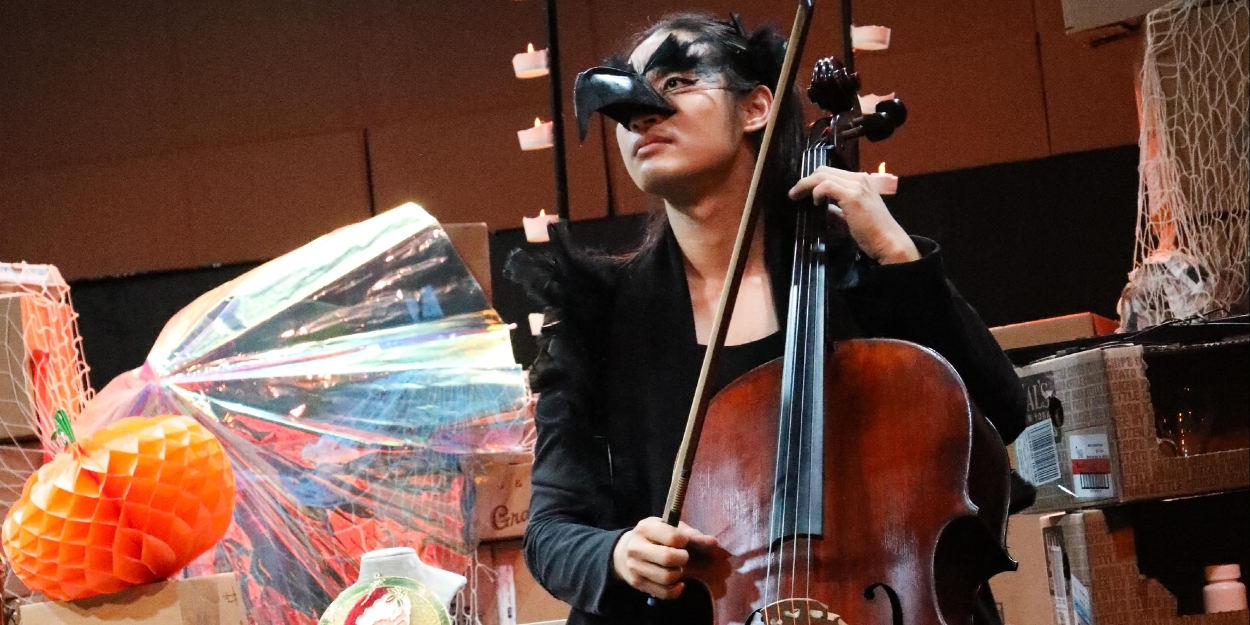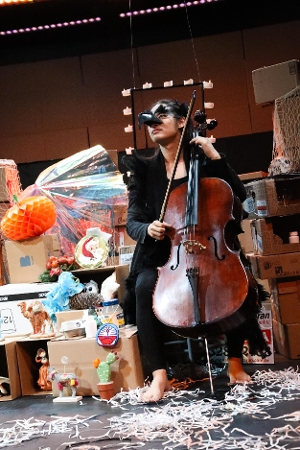Interview: Timmy Ong of THE SACRIFICE OF CASSAMBA BECKER at Rattlestick Theater
Timmy Ong On Malaysian vs NY Theater, Off-Broadway, and Taking Breaks


Between getting his Off-Broadway debut with a guitar and cello, building a puppet, and booking a Nickelodeon project that he had to turn down, Timmy has had an artistically fruitful year.
A Malaysian-born, New York-based actor, he has done both “conventional” musical theater, like originating the role of Lamont in the stage adaptation of Mr. Holland’s Opus–not so conventional as it required him to play the cello too–as well as unconventional theater, such as making site-specific work involving puppets.
Following his nomination for Best Performance In A Play in the 2023 BroadwayWorld Off-Broadway Awards for his role of Procopio the Vulture in The Sacrifice of Cassamba Becker, which received four other nominations, we talked about the difference between Malaysian and New York theater, working on the award-nominated play, and what downtime entails for this versatile, cross-disciplinary artist.
It seems like you are really flourishing in New York City. But, tell me about how you started as a performer.
My journey started in Malaysia, where I was born and raised. In high school, I played the piano and lightly tinkered with theater, but I really began my serious training while I was in college, even though I was majoring in IT instead of performing arts because of my traditional parents. My first gig very quickly out of tech school was a tour of a homegrown Malaysian musical revival titled Broken Bridges. That essentially launched me into professional theater, because friendships and connections from that tour opened up many more doors.
The year after [the tour], I got to originate a principal role in a new musical called Xuan Zang: Journey to the West at one of the most prestigious theaters in Malaysia, and even recorded the original cast album. That project led to another original principal role in another musical called Di Zang the Musical by the same creators a few years down the road, also with an original cast recording. And between those two, of course there were many projects that happened, but the point is, I just fortunately kept finding work! And then, slowly, in the gaps between projects in which I was just acting, I started making my own work too as opportunities came up. I learned to wear multiple hats as writer-director or writer-actor, but that is satisfying in a different way.
After six, close to seven years of professional theater in Malaysia, I felt like I was ready for more, so I decided to cross the big pond and further grow my career in New York City. I really love it here, and things seem to be working out! [laughs]
Are there any differences in being a performer in NY compared to Malaysia?
Oh, so very different! In Malaysia, there is more room to play and experiment and make new work. Not to say that doesn’t exist in New York City; there are definitely places and companies that do new work here. The difference is, it becomes so much more difficult–because it gets so much more expensive–to produce new work at a higher level in New York. My little unverified theory is that this is why American theater in general loves its “canon literature” so much, from Shakespeare to the same musicals that keep getting revived: it is so much safer, or less financially risky, to do something that has been tried and tested.
Whereas in Malaysia, because the playing field is so much smaller, in my opinion, we actually have more freedom to play and try things, and make mistakes, if you will. But the downside to that is the direct opposite of New York theater: a lot of work in Malaysia is truly ephemeral; after one production, or one good run, even a very good piece of writing never sees daylight again. Sometimes the script or material is not even properly documented or published, and therefore not licensable. So it becomes precious to get to reprise a role.
I guess my point is: I get to do a lot of new work in Malaysia, to the point where doing new work became, like, my thing, and I kind of took it for granted. But New York “sobered” me up; I feel more pressure to fit into molds as an actor. Like, am I more “right” for, say, Evan Hansen than Seth in Kimberly Akimbo? Am I more Romeo than Mercutio? It can get a little tiring, so I find myself gravitating towards new work, which is so precious in New York, understandably, but I love having total freedom to create a new character. Coming out from the pandemic, I sense that there are more and more roles getting created that fit me and my personhood. That’s great!
Speaking of new work, your Off-Broadway debut earlier this year got a few nominations in the BroadwayWorld Off-Broadway Awards! Congratulations! What was it like working on the play?
Oh yes, thank you! [The Sacrifice of] Cassamba Becker was such a whirlwind. I am very happy about the nominations, and very grateful for that experience, but oh it happened so fast. I auditioned late March or early April, and “got the call” by mid April. Then there was this almost gestation-like period of almost two months before the first day of rehearsal late May. I was communicating back and forth with João [Victor Toledo], the creator and the other actor of the show, because he was in Brazil but wanted to make sure that I got all the context for the show before we jumped into the short but intense rehearsal period. Part of my role in the show was to play music, but his vision was for us to figure out what to play together, so I had to know his research and influences, artistic intent, and all that writer stuff.
At first I only played the guitar and sang, but then it felt like the cello was wanted, or needed. So I busted that out too. [laughs] It took us a few tries to land on some preliminary choices before rehearsals started, but we actually did not have all the parts figured out until our final day of rehearsals, if I am not mistaken. Because of how tight time was, most days, after rehearsals, I actually went home and did “homework” so that I had some options to show the next day, whether on the guitar or cello, or my voice with one of the instruments. We really did not have too much time to jam, improvise, or experiment, musically, in the rehearsal room.
However, in the end, it was very satisfying for me. On top of playing this clown-like character, I got to sing and play guitar and cello, but not in a beautiful music theater kind of way–not that there is anything wrong with that–but it was beautiful to play in a raw, theatrical way. I personally think the run was too short, and I think João would agree with me. [laughs]
Do you think there is going to be another production of it on a different stage? Or is it going to go the “Malaysian way” and never see daylight again?
I sure hope there will be another run! I think João is interested in further developing it, I remember him telling me that, but like most things in show business: you never know until you see it–or, at least, that is the attitude that I like to take. But the run that we had, it actually could not have been longer, because about a week after it ended, I had two site-specific pieces in a one-night-only show at A.R.T./New York [Theatres]!
Oh wow. Tell me more about that.
Yes, so back in March–I think it must have been a week before Cassamba’s audition–someone shared with me that A.R.T./New York Theatres were celebrating their 50th anniversary in June, and were looking for independent artists to create work for them in conjunction with that. I proposed two pieces for them, thinking they would pick one of them, but they ended up liking both of them enough that they wanted me to create two pieces! Both were site-specific, because that was kind of the theme, but one was a–I would call it–scene and song compilation, and the other one was a puppet piece. So when I was working on Cassamba Becker, I was actually stealing time to craft these two pieces. But the bulk of the executing, which included the construction of the puppet, and rehearsals for both pieces, actually happened in the span of a week! Luckily, they were both fairly short pieces, and I had amazing collaborators who really rose to the occasion. All in all, they turned out pretty well. I am actually looking to further develop the puppet piece into a full one-act.
Do you ever take breaks? What do you do in your downtime?
[laughs] I am actually not great with taking breaks. The artist in me is always thinking about the hustle, because that’s kind of what the system has ingrained in me: that if I want to be a working, productive, relevant artist, I have to keep up the chase. However, I had a health thing recently that ended up requiring surgery, and I am really, really trying to get better at taking care of myself.
So, since last year, I had been dealing with some gut issues. I don’t really want to get into it, but it is colorectal stuff, and every time I thought it was over, new symptoms just kept coming up. Maybe it was stress, maybe it was my lifestyle, maybe a combo, I don’t know. It is now resolved, but back in early July, when I was done with back-to-back shows and finally saw my GI [doctor], he actually told me I might need surgery. That was when I really slowed down. In fact, around that time, I booked the role of Ryder in Paw Patrol Live!, a live-action tour that traveled internationally, but after consulting my doctor, I decided to turn it down, because having done tours before and knowing my body, I didn’t think the constant traveling would help my gut. That decision was really difficult to make. Intellectually, I understand that there would be future tours like that for when I am healthy and strong; but still, turning down a Nickelodeon project, ah! It made me feel so bummed out!
However, looking back now, it oddly feels like foresight, because, one, I did end up having the surgery, which would probably have required me to quit the show; and two, I had another very cool project lined up for after I recovered. So it all worked out.
But anyway, to answer the question, yes, I do take breaks, or so I am learning to.
So what do you do in your downtime?
In my downtime, such as the one I had post-surgery, I read. And watch movies, which I don’t do enough of, oddly, as an actor. And deep-clean my room? [laughs] Or, realistically, find something crafty to do. Like repair my clothes, or DIY a small household thing, or something. Because I can’t “veg out” for too long. My brain would take me to personal project land. Because, I don’t know, I like to be doing something. I like to have something to look forward to. So whether consciously or not, even if it is something tiny but fulfilling, I always have something lined up. I like to have something lined up. [laughs]
Comments

Videos

